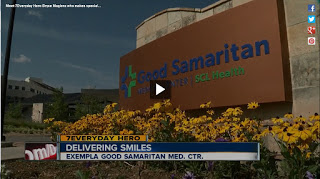
Today I’d like to tell you about Telematics.
Telematics refers to the use of wireless devices and “black box” technologies to transmit data in real time back to an organization. Typically, it's used in the context of automobiles, whereby installed or after-factory boxes collect and transmit data on vehicle use, maintenance requirements or automotive servicing.
You may not be aware of this fact, but Imagine! has a rather large fleet of vehicles that we use to transport the individuals we serve to the various activities, like to job sites, or activities in the communities, or to medical appointments.
Our fleet is vital to our success, and we are embarking on a pilot project to test Telematics to identify how best to utilize those assets. It will also help determine which vehicles should be replaced and when.
We are starting the pilot out this month with a demo, which will include five vehicles from our
CORE/Labor Source and
Out & About departments. During this time, we will have a chance to test the product as well as familiarize ourselves with the program. If all goes well, we’ll place an additional 40 vehicles on the plan within these two groups. At the end of the first year we’ll determine the value of adding other parts of the fleet.
How It Will Work
GPS units will be linked to each vehicle’s own computer. This provides live vehicle location (tracked on the web via computer or smart phone), as well as vehicle diagnostics, such as fuel consumption, speed/direction of travel/routes and stops, idle-time, etc.
Each department will be able to track their own specific fleet as well as see the entire Imagine! fleet for comparison purposes. Detailed data reporting in regards to specific vehicles or the whole fleet will be used to benchmark opportunities for improvements.
Results
We are hoping to achieve/improve on the following:
Safety
- vehicles and their occupants will be visible 24/7 to supervisors. This is especially important during bad weather days or in the event of a breakdown
- companies using Telematics report a reduction in their accident rates
- this program comes with free 24/7 roadside services available to enrolled vehicles
- vehicle alerts when seatbelts are not in use while moving
Fuel Savings
- by monitoring idle times, monitoring driving habits (speeding, fast acceleration, harsh braking), and monitoring each vehicle's fuel efficiency
- improved dispatching/routing leading to fewer miles traveled
Maintenance
- automated service alerts (oil changes, safety inspections, etc.) will help ensure services are done in a timely fashion
- all Department of Transportation safety recall notices will be sent automatically
- engine trouble codes will be transmitted for proactive mechanical attention
We’re excited to embark on this project. Whenever we are able to be more efficient with the logistics of our work, it means we can focus more energy and resources on delivering great services and opening doors to community participation among individuals with intellectual disabilities.



















